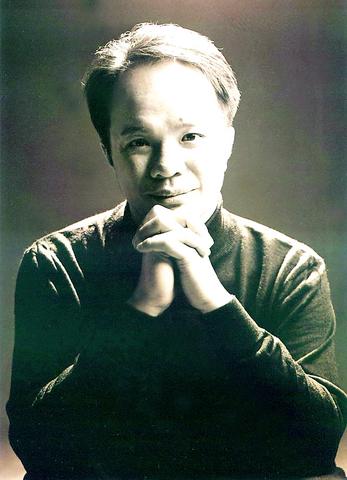Not many 10-year-olds tickle the ivories as symphony soloists, so after Tainan-born Rueibin Chen (陳瑞斌) did so in 1978 with the Taipei Symphony Orchestra, big things were expected of him.
At 13, Chen moved to Vienna, obtaining a concert diploma and a subsequent soloist's examination award in Hanover, Germany, before going on to take master classes under Murray Perahia. He has since collected a mantle of highly prized awards, including Vienna's Boesendorfer Prize in 1983, Paris' Albert Roussel Prize in 1991 and Taiwan's own "best arts performance" prize in 2000.
That was the last time Chen played in Taiwan and he's making a welcome return in a series of three concerts starting in Taipei tomorrow, Nov. 9, then moving to Taichung on Friday, Nov. 11 and returning home to Tainan on Friday, Nov. 15.

PHOTO COURTESY OF MUSICPOWER
"The pressure playing in Tainan is intense compared with Taipei," Chen said in a telephone interview at the end of a full day of rehearsing. "The audiences there are more conservative, more accustomed to traditional Taiwanese entertainment than they are to classical music.
"Besides, my parents are there," he added laughing. "That makes it really intense."
To hear Chen admit stage freight seems unusual for a musician of his caliber. Since his European debut in 1984 at the Vienna Koncerthaus, he has performed non-stop at one festival after another: the International Salzburg Music Festival, the Vienna Spring Festival, the Schleswig-Holstein Music Festival, the Hong Kong Festival, the International Rachmaninoff Music Festival in Moscow and the Taipei Music Festival, where he performed for the first time Rachmaninoff's complete concertos.
In 1989 he was selected "best young artist" by Taiwan's Ministry of Culture. Three years later, he was asked by then president Lee Teng-hui (李登輝) to play at the Presidential Palace in a festival concert that was broadcast across the nation. He's won international piano competitions in Warsaw, Tel Aviv, Athens, Vienna, Rome and even played for former Israeli president Itzhak Rabin.
"2000 was the last time I played as a soloist in Taiwan," Chen said.
"Before then, I had the honor of accompanying the Taipei Symphony Orchestra as piano soloist on their 1998 tour of Asia."
Chamber music is another area in which Chen excels. He has performed with well-known groups like the Shanghai Quartet and Lark Quartet. So can Taiwan audiences expect a song or two at any of his concerts? "No, no, no," he says. "No singing. Strictly piano."
Rueibin Chen plays the Taipei National Concert Hall (台北國家音樂廳) tomorrow night at 7:45pm. Performances at Taichung's Chungshan Hall (台中中山堂) and the Tainan City Arts Center (台南市立藝樹中心) both begin at 7:30pm. Tickets are available online at http://www.ticket.com.tw or by calling the venues; Taipei (02) 2341-9898, Taichung (04) 2292-5321, Tainan (06) 214-9441.

A vaccine to fight dementia? It turns out there may already be one — shots that prevent painful shingles also appear to protect aging brains. A new study found shingles vaccination cut older adults’ risk of developing dementia over the next seven years by 20 percent. The research, published Wednesday in the journal Nature, is part of growing understanding about how many factors influence brain health as we age — and what we can do about it. “It’s a very robust finding,” said lead researcher Pascal Geldsetzer of Stanford University. And “women seem to benefit more,” important as they’re at higher risk of

March 31 to April 6 On May 13, 1950, National Taiwan University Hospital otolaryngologist Su You-peng (蘇友鵬) was summoned to the director’s office. He thought someone had complained about him practicing the violin at night, but when he entered the room, he knew something was terribly wrong. He saw several burly men who appeared to be government secret agents, and three other resident doctors: internist Hsu Chiang (許強), dermatologist Hu Pao-chen (胡寶珍) and ophthalmologist Hu Hsin-lin (胡鑫麟). They were handcuffed, herded onto two jeeps and taken to the Secrecy Bureau (保密局) for questioning. Su was still in his doctor’s robes at

Last week the Democratic Progressive Party (DPP) said that the budget cuts voted for by the China-aligned parties in the legislature, are intended to force the DPP to hike electricity rates. The public would then blame it for the rate hike. It’s fairly clear that the first part of that is correct. Slashing the budget of state-run Taiwan Power Co (Taipower, 台電) is a move intended to cause discontent with the DPP when electricity rates go up. Taipower’s debt, NT$422.9 billion (US$12.78 billion), is one of the numerous permanent crises created by the nation’s construction-industrial state and the developmentalist mentality it

Experts say that the devastating earthquake in Myanmar on Friday was likely the strongest to hit the country in decades, with disaster modeling suggesting thousands could be dead. Automatic assessments from the US Geological Survey (USGS) said the shallow 7.7-magnitude quake northwest of the central Myanmar city of Sagaing triggered a red alert for shaking-related fatalities and economic losses. “High casualties and extensive damage are probable and the disaster is likely widespread,” it said, locating the epicentre near the central Myanmar city of Mandalay, home to more than a million people. Myanmar’s ruling junta said on Saturday morning that the number killed had